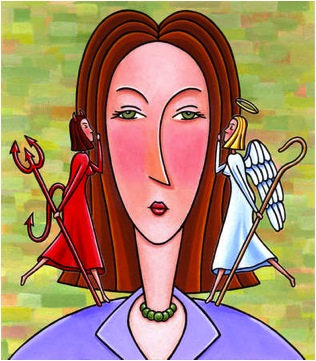I have my petty, embarrassing moments. Even though I make a point to live in the moment, to find happiness and contentment in the mundane routine that I thrive on, that cackling shoulder-devil somehow manages to wriggle out of his leash and murmur into my ear.

Seasonally, an entire roster of available eligibles pair off. Nearly every day there is another chirpy e-mail from the shul, burbling with the merry news that so-and-so is engaged to such-and-such. The little red horned fellow digs his sharp nails into my neck, inciting my frustration and ingratitude.
But I know, I really do know, that my existence is blessed.
But I know, I really do know, that my existence is blessed.
So many others that I had believed were coccooned in bliss and calm—they were actually being flattened with worry and fear. Then whatever childish jealousies I had nourished are augmented by guilt; do I really require the sadness of others to find life meaningful? Am I that person?
Richard H. Smith's "The Joy of Pain" (reviewed by Christie Aschwanden), tackles schadenfreude, of course beginning with its evolutionary purpose (animals are prone to it as well).
It is quite disturbing that if there are those out there that we perceive as "higher" than us, down they must come. Not just the ones who are seemingly more successful, but even the ones who appear as "better" human beings as well.
Rabbi Berel Wein has told over this story a number of times; a member of his congregation who was prone to tardiness felt inspired by a speech and decided to put more effort in coming to shul promptly. But no one would let it go. "Aaaah, your wife threw you out of bed?" and other charming comments. What can a man do? He stopped trying to improve.
Schadenfreude's root is in plain old insecurity. Everything is a personal affront—someone else's home, car, schedule, social circle, and so on—all manifesting as vindictive jabs to our sense of worthiness, our—ahem, my—ego translating a couple's engagement as judgement on my value.
 But it's not about me. My life is my life; it has been calculated from Above for my own specific needs, and I can only focus on that which I can control, which is remodeling the interior, bit by bit.
But it's not about me. My life is my life; it has been calculated from Above for my own specific needs, and I can only focus on that which I can control, which is remodeling the interior, bit by bit.
I don't want to be capable of compassion only when someone else's scandal is vomited onto the media. I don't want to be threatened when someone else finds purpose and joy. I don't want to feel validated only when someone else slips on the hypothetical banana peel.
I want to practice empathy on its own merits.
Richard H. Smith's "The Joy of Pain" (reviewed by Christie Aschwanden), tackles schadenfreude, of course beginning with its evolutionary purpose (animals are prone to it as well).
It is quite disturbing that if there are those out there that we perceive as "higher" than us, down they must come. Not just the ones who are seemingly more successful, but even the ones who appear as "better" human beings as well.
We take extra delight when schadenfreude seems deserved, as it does when the person’s higher status damages our self-image. Research by Benoît Monin, a Stanford social psychologist, shows that the mere presence of a vegetarian can make omnivores feel morally inferior, as they anticipate judgment.
But this also runs the other way. When others are "lower" than us, that is a comforting balm to our insecurities.“Vegetarians need not say a word; their very existence, from a meat eater’s point of view, is a moral irritant,” Dr. Smith writes. Discovering hypocrisy in the high-minded person eases this irritation, so catching a vegetarian devouring a hunk of meat gives steak lovers a burst of schadenfreude: “We are not as inferior as we were led to believe; now we can assume the contrasting position of moral superiority.”
Rabbi Berel Wein has told over this story a number of times; a member of his congregation who was prone to tardiness felt inspired by a speech and decided to put more effort in coming to shul promptly. But no one would let it go. "Aaaah, your wife threw you out of bed?" and other charming comments. What can a man do? He stopped trying to improve.
Schadenfreude's root is in plain old insecurity. Everything is a personal affront—someone else's home, car, schedule, social circle, and so on—all manifesting as vindictive jabs to our sense of worthiness, our—ahem, my—ego translating a couple's engagement as judgement on my value.

I don't want to be capable of compassion only when someone else's scandal is vomited onto the media. I don't want to be threatened when someone else finds purpose and joy. I don't want to feel validated only when someone else slips on the hypothetical banana peel.
I want to practice empathy on its own merits.
I know the feeling. I saw on fb the other day that a friend had gotten engaged. Of course I'm happy for her, genuinely so, but there's that twinge of jealousy.
ReplyDeleteBeautiful post.
ReplyDeleteFG: Twinge? I've been completely flattened. Yet being happy . . . we seem to be walking contradictions. We must remember always of that gray factor, since none of us are black and white.
ReplyDeleterr: Thank you.